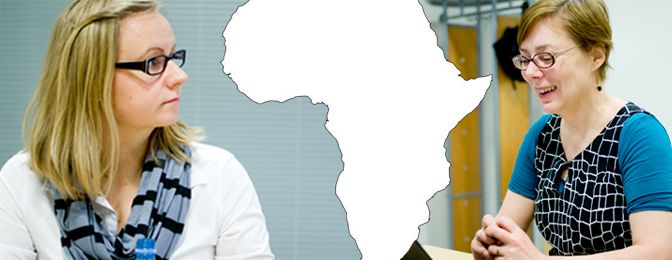
Libraries can save lives
Turku University of Applied Sciences (TUAS) contributes to the development of the library sector in Africa. In small communities, libraries are valuable promoters of equality, well-being and knowledge.
Text ja picture: Veera Säilä, journalism student
In multicultural Africa, languages and educational practices vary greatly. Coordinated by TUAS, the Library and Information Studies Network project has succeeded in increasing communication within Africa, as it involves participants from both French-speaking and English-speaking countries.
"On a larger scale, the project promotes the UN Millennium Development Goals as well as equality and interaction between societies, among other UNESCO goals,” says Project Planner Paula Pitkäkangas.
The project has proved that library spaces are important. In many African countries, they are regarded as places where it is safe for girls to do their homework.
In terms of well-being in society, it would make sense to invest in public libraries as providers of health information, such as pregnancy and birth education. Many critical issues could easily be prevented by providing accurate information.
Theory meets practice
“Research universities carry out research, and universities of applied sciences seek to apply the results of that research,” says Project Manager Ritva Hyttinen.
Research Information Literacy, a one-week intensive course offered in Tanzania in early June, combines theory with practice.
“The course focuses on the findability, availability, accessibility, evaluation and use of scientific information,” says Hyttinen.
The course is a prime example of good cooperation. It will be attended by students and teachers from all of the partnering higher education institutions in Africa and Finland. The expert lectures will focus on research and health information, social media and the acquisition and dissemination of information, among other aspects.
Broader horizons through lecturer exchange
While Finland shares its expertise in the development of the library sector, the country has a great deal to learn from the multicultural and multilingual Africa.
“We are not just giving. Through cooperation, we in the North can learn from the South, and vice versa,” says Hyttinen.
Expert exchange between higher education institutions offers lecturers in the partnering countries an excellent opportunity to get to know one another and learn new teaching methods. Hyttinen has worked in Senegal and Tanzania through lecturer exchange. She would like to import the culture of rewarding discussions between students from Africa to Finland. Her experiences are now reflected in curriculum planning.
Similar content, different methods
The project enabled Sara Nuuyoma and Olivia Ebas from Namibia to participate in library education in Finland. They say that the content of library education is relatively similar in the two countries, but teaching methods are different.
They would like to introduce an online learning environment similar to Optima, for example, in their home country. In their opinion, distance learning opportunities in particular should be developed in Namibian schools.
Library and Information Studies Network
The Library and Information Studies Network was launched in 2005 to develop education in the field. The project facilitates cooperation between Finnish and Namibian higher education institutions.
Funded by the North-South-South programme managed by CIMO, the project involves a network of partnering higher education institutions in Finland, Namibia, Senegal, South Africa and Tanzania. TUAS has served as the project coordinator since the spring of 2013.
More information: www.nsslisnetwork.org
